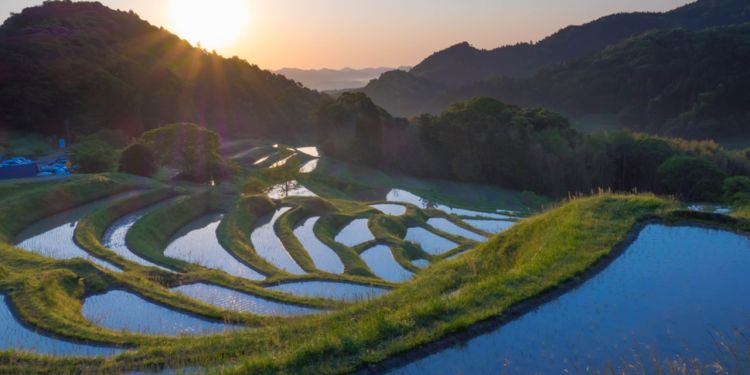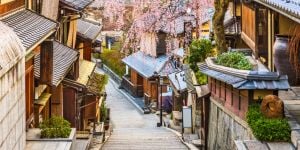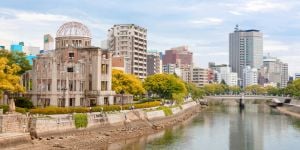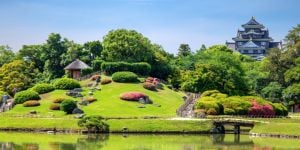
Chiba is sometimes mistaken as an extension of Tokyo. It is part of the Greater Tokyo area, contributing to this confusion, but Chiba is the capital of its eponymous prefecture and is an economic pillar of Japan. Which sectors are the most attractive there? How to find a job in Chiba?
Mapping Chiba
Chiba translates into a thousand leaves in English. Behind this name is that of a capital, of a city, and of a Japanese prefecture adjacent to Tokyo. Chiba City has six wards: Chuo-ku, the center ward, Hanamigawa-ku, Inage-ku, Midori-ku, Mihama-ku, and Wakaba-ku.
By December 2023, the total population of Chiba City was 980,208. Most of them are concentrated in Chuo-ku, with 215,465 inhabitants. Hanamigawa-ku follows, with 177,523 inhabitants. Then, Inage-ku had a population of 160,231, Wakaba-ku had 145,021, Midori-ku had 129,326, and Mihama-ku had 152,642 inhabitants (source: estimated population of Chiba City).
Distribution of the population
By September 2023, the working-age population, ranging from 16 to 64 years old, comprised 62.5% of the total population, comprising 611,969 individuals. Among them were 216,734 people aged 20 to 39, while those aged 40 to 59 comprised 294,873 individuals.
The population aged 65 and above was 257,325 individuals, constituting 26.3% of the total population. Furthermore, the number of individuals aged 0 to 16 amounted to 109,260, accounting for 11.2% of the population (source: Chiba population by age).
Living in Chiba City
The city extends over 271.8km², with a population density of nearly 3,600 inhabitants per km². That's a lot! Chiba's capital city has a dynamic economy, partly due to its proximity to Tokyo.
The Narita airport is also located in Chiba. Tourists often think they are landing in Tokyo when they are landing in Narita, a city in the Chiba prefecture (to land in Tokyo, you have to choose Haneda airport), but Chiba is not meant to remain in the shadow of the sprawling capital.
The local authorities boast of its strengths, starting with its geographical position. For foreigners looking for a job in Japan, choosing Chiba has several benefits: life is less expensive than in Tokyo, and job opportunities offer good career prospects.
Chiba Prefecture's economy
Chiba Prefecture has a population of 6.26 million as of March 31, 2023, making it the sixth most populous prefecture in the country. It is known for its strong economy, with a prefectural income of ¥19.2 trillion and a gross prefectural product of ¥21.2 trillion, ranking sixth and seventh in Japan, respectively.
Chiba Prefecture is a thriving economic center, particularly in commerce, agriculture, and fishing industries. The region is home to the prestigious "Keiyo Industrial Zone", which houses various companies like oil refineries, petrochemical plants, and steel manufacturers. These industries strategically take advantage of the location along Tokyo Bay.
Chiba Prefecture has several industrial parks, including "Tokatsu Techno Plaza" and "Kazusa Akademia Park", where cutting-edge research and development activities are conducted in collaboration with the government, industries, and academic institutions.
In terms of agriculture, Chiba Prefecture is recognized as one of Japan's leading agricultural prefectures. Its suburban areas utilize advanced farming techniques, capitalizing on the favorable climate with warm winters and cool summers. The prefecture's proximity to densely populated areas ensures a large consumer base for its agricultural products.
Furthermore, Chiba Prefecture has abundant fishing grounds, surrounded by the sea on three sides. It ranks among the highest in Japan for fishing aquaculture production, with notable fishing ports like Choshi Port, which records the country's highest volume of fish catches.
Besides its economic strength, Chiba Prefecture is famous for its captivating tourist attractions. The region is home to renowned destinations such as the Tokyo Disney Resort, picturesque beaches, the Minamiboso Quasi-National Park, and the Suigo-Tsukuba Quasi-National Park. These attractions attract many foreign tourists, solidifying Chiba Prefecture's position as a popular tourist destination.
Chiba Prefecture is experiencing significant economic growth potential. Various public infrastructure projects are under construction, including the Ken-O Expressway, which will be fully open by FY2024, and plans for the Kita Chiba Road and other access roads.
In March 2023, a new station called "Makuhari Toyosuna Station" opened on the Japan Railways Keiyo Line. Furthermore, Narita International Airport is set to construct a new third runway by FY2028. Chiba Port and other trade ports like Kisarazu Port also invest in expanding their functions and disaster preparedness (source: Features and strengths of Chiba Prefecture).
According to official figures, Chiba's economy is worth more than 3.9 billion yen, which makes the city an economic powerhouse. The Statistics Bureau of the Ministry of Internal Affairs and Communications lists more than 30,000 companies in the city.
Chiba has set up a subsidy scheme to facilitate the setting up of new companies in the city. It mainly applies to the purchase of new factories, new office buildings, business premises, etc. These subsidies benefit both companies and workers.
Depending on the amount the new company plans to invest in Chiba, the city can provide up to 500 million yen in tax assistance over 5 years. It can also provide a 500,000-yen allowance for any worker who moves to Chiba or already lives there.
With these aids and incentive programs, Chiba has made its objectives straightforward. The city seriously intends to become a Japanese "Silicon Valley". For this, it can also count on its three hubs: the Chiba city center, the Makuhari new city center, and the Soga sub-urban.
Chiba City Center
The Chiba City Center is a concentration of companies in information and communication, trade, and business (management, finance).
Makuhari New City Center
The Makuhari New City Center focuses on innovation and "international spirit". It offers a wide range of services to make life easier for businesses. It capitalizes on its expertise in trade. Popular with tourists and entrepreneurs alike, Makuhari is designed to be a new stronghold for international trade.
Soga Sub Urban
Soga Sub Urban offers an ecosystem based on the start-up concept with dedicated residences and parks, among other amenities. It also operates in the commercial and business spheres.
Sectors that are recruiting in Chiba
Industry
Driven by its powerhouse, Chiba City, the prefecture is in the top 10 of the country's largest industrial centers. Its significant areas of expertise include the chemical, petroleum, and steel industries. Together, they produce more than 50% of the prefecture's wealth.
Trade and commerce
Along with industry, the service sector is another heavyweight in the prefecture's economy. In Chiba City, things happen, with ultramodern hubs focusing mainly on retail, like the impressive shopping and leisure center Makuhari Mall AEON. It shares the stage with the Mitsui outlet park Makuhari, the Harbor City SOGA, and the Chiba PARCO.
PARCO is a giant in the fashion sector that owns stores all over Japan, while AEON is a holding company. This retail behemoth owns 24/7 convenience stores, pharmacies, super- and hypermarkets, shopping malls, and more. AEON's HQ is also a symbol of success. The company's head office is in the AEON Tower in Chiba city.
Agriculture and fisheries
In Japan, a government-driven experiment aims to reinvest in the countryside. It is referred to as the "Return to The Countryside Program". Between 2012 and 2019, nearly 600 municipalities, including Chiba, were involved in the experiment.
With its essential agricultural and fish farming sectors, Chiba Prefecture is one of the country's most significant suppliers of vegetables, fruits, and fish, which Tokyoites consume abundantly. This is how the geographical position of Chiba in Tokyo Bay also contributes to the dynamism of its thriving agricultural and fish industry.
Chiba's major corporations
Like Yokohama, Chiba benefits from its advantageous geographical position to attract companies. The prefecture has Narita and its international airport. With hubs like the Makuhari New City open to the global markets, many Japanese commercial juggernauts continuously invest in Chiba.
Businesses related to Narita Airport
Narita is one of Japan's gateways to the world. The city counts many companies related to the aviation industry, starting with Narita International Airport itself. Local companies like Prologis, GLP Japan, Nippon Express Company, Kinetsu World Express, etc., are taking advantage of Narita's influence. This is also the case for real estate, hotel, and restaurant companies that seek to capitalize on the "Narita effect".
Companies in the medical sector
Arcturus Therapeutics, an American company manufacturing drugs based on RNA Messenger technologies, has decided to set up in Kashiwa, a city in Chiba Prefecture. Production is expected to begin next year. Arjuna Therapeutics, a Spanish company that develops treatments for refractory cancers, was also set up in Kashiwa last year.
The food industry
Among the big corporations based in Chiba, Kikkoman is world-famous for its soy sauce, but they are not the only ones. Other big local companies such as Yamasa Corporation, Ishii Food, and Japan Foods have also established business there.
As a result, these companies today represent an immense pool of career opportunities for foreigners in Chiba, and more foreign companies are coming in. In 2020, for instance, Chiba City saw the arrival of the American company Kinetic Technologies, which specializes in producing semiconductors that have become a very sought-after commodity since COVID.
Chiba: The sharing economy
Local authorities are convinced that the combination of nature and economy can be profitable. The Chiba Prefecture would like to be the demonstration of this concept, with its vast countryside and urban areas.
As an agricultural and industrial powerhouse, the prefecture cultivates its uniqueness. Both sectors rely on each other and are believed to benefit from one another. Innovation helps agriculture, which in turn helps innovation. This is the spirit of Chiba, summarized in the term "sharing economy".
The three "eco-economic" projects of Chiba
The first project concerns the entire prefecture, particularly the Wakaba and Midori districts, where nature and agriculture are prevalent. The project is about creating "special zones" dedicated to green tourism and visitor accommodation. Its prime objectives are to promote the regional economy and to reconcile agriculture and economy.
Regarding transportation, Chiba has rethought its infrastructure to allow more bicycle space. The "ShareCycle" project started in 2018 with a test on 110 bikes positioned from Chiba Station to JR Kaihim Makuhari Station. The operation was so successful that it grew to a monthly usage of 15,000 bikes in the same year.
Also in Chiba City is a third project called "Chiba Report", nicknamed Chiba Repo for short. It is about inviting all the residents to report any everyday-life problem they encounter via a dedicated app. There again, the objective is to improve public services and utilities.
Assessing the sharing economy concept in Chiba
All these initiatives have had a positive impact on Chiba's economy. As a result of these innovative projects, new businesses are being created in the region. Chiba Repo is mobilizing developers and engineers, ShareCycle is bringing in bike builders and repair shops, and the Special Zones are boosting eco-friendly tourism and heftily supporting the local economy. For expats, these are all career opportunities to consider in Chiba.
How to look for a job in Chiba
Before you begin your job search in Chiba, ask yourself and answer the following questions:
- What is your employment status?
- On what visa are you traveling to Japan?
- Do you have a student or Japanese Working Holiday Visa (WHV)?
- Are you applying for a job in your country?
- What is your situation? Are you single or married?
- Are you moving to Japan as a couple, with or without children?
- What do your family and friends think of your move to Japan?
- And if you are coming to Japan for an extended period, like more than 90 days, what type of position are you looking to occupy?
Of course, you will need to deploy different tactics depending on the type of work you seek, but remember that your visa will affect the type of jobs you may apply for. On a student visa or WHV, for instance, you can only work 28 hours per week and are not allowed to work in the nightlife sector.
Small jobs, called "baito" in Japanese
Although since COVID, the saying "you can find a "baito" on every street corner" seems to have become less relevant; there are still a lot of jobs available in Chiba. You don't need to be highly qualified to get a job there, especially in sharehouses, catering, cafes, restaurants, etc. Sometimes, they won't even ask you to be fluent in Japanese.
In other words, “baitos” will be less demanding on you because you can be easily replaced. However, no company will sponsor you for a "baito". It is too much paperwork for them, and these jobs offer almost no return on investment. Also, remember that it is essential to learn Japanese if you want to land a job. You will get better deals and be more comfortable at work, especially if the company is Japanese.
Open-ended employment (seishain contract)
Companies will endorse this kind of job, and this is what many foreigners who want to work in Japan are looking for. The "seishain" contract is much more challenging to obtain than the job itself.
The entry requirements are stricter, and besides having the right degrees and skills, you must pass the Japanese Language Proficiency Test or JLPT (Nihongo Nôryoku Shiken). Companies require Level 2 (N2), an advanced intermediate level, but more and more companies are asking for Level 1, the bilingual level.
Job search in Chiba
You name it: general and specialized job websites, unsolicited job applications, social media, Japanese and international associations! All these tactics work, and you should activate any of them, if not all, to find a job in Chiba.
Not surprisingly, you will get better results if you start searching in Japanese, hence the importance of having a good command of the language. English is, of course, a professional advantage, but Japanese is still a must. It is the national language, and learning it will prove your motivation and your willingness to integrate.
Chiba or Tokyo?
Isn't Tokyo a better choice when looking for a job? As the capital city, Tokyo technically has more employment opportunities to offer, but one can easily opt for commuting daily and take advantage of the cheaper rents in Chiba while aspiring to potentially higher salaries in the Japanese capital. This is indeed a sound argument. Chiba station is only 40 minutes away from Tokyo station by rapid rail.
Many foreigners fear that they won't find work if they move away from the capital, and this concern has been exacerbated since COVID, but you can bet on Chiba, especially if you have strong skills in the fields that drive the region's economy.
Working in Chiba: Some extra tips
Be patient and bold. Many foreigners dream of living and working in Japan. Be organized, and start your job hunt as early as possible. For example, if you are on a temporary work permit in Japan, don't wait until the end of your visa to look for a job.
Avoid mentioning your dream of immigrating to Japan in your WHV application. The Japan Working Holiday Visa only lasts one year, with an obligation to leave the territory. Show that you understand the spirit of the visa and provide a well-balanced plan. Once in Japan, you will be free to look for a job. If you find one, remember that you are limited to 28 hours per week on the Working Holiday Visa.
Useful links:
We do our best to provide accurate and up to date information. However, if you have noticed any inaccuracies in this article, please let us know in the comments section below.








